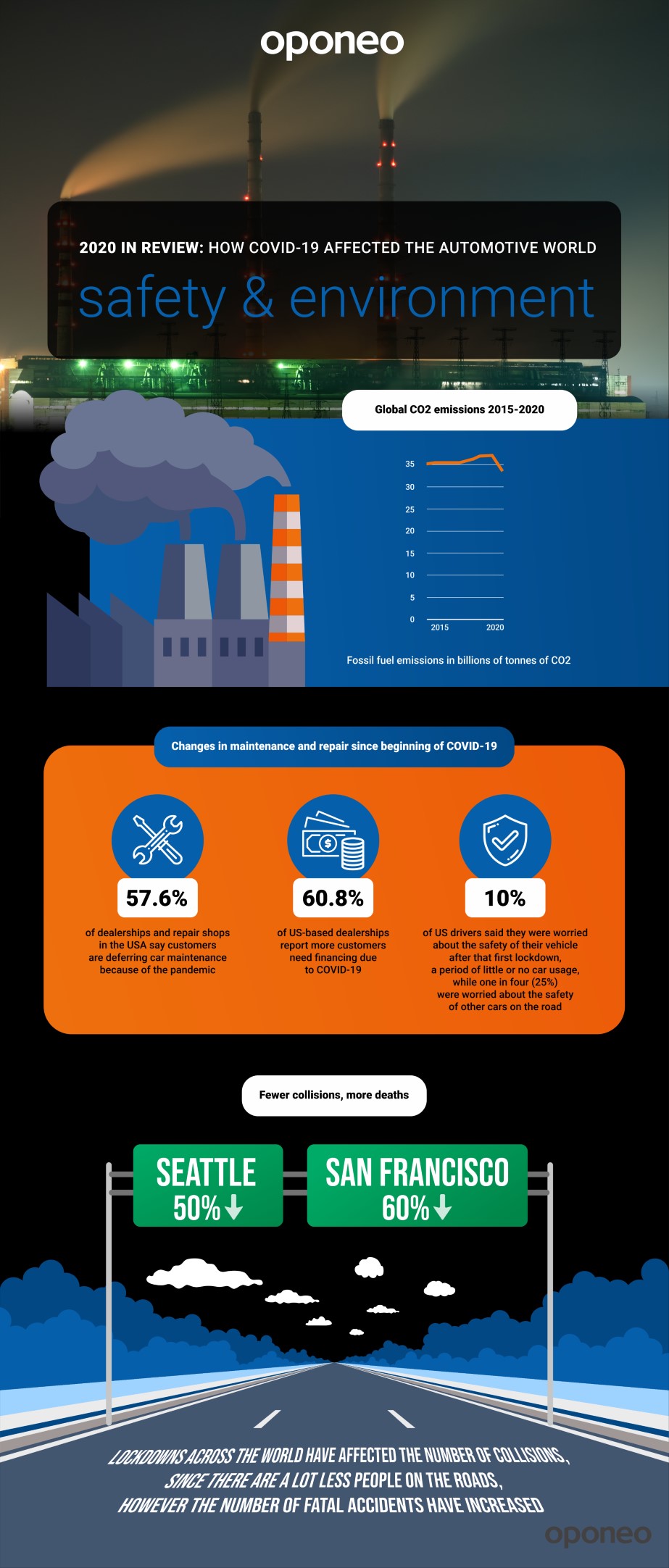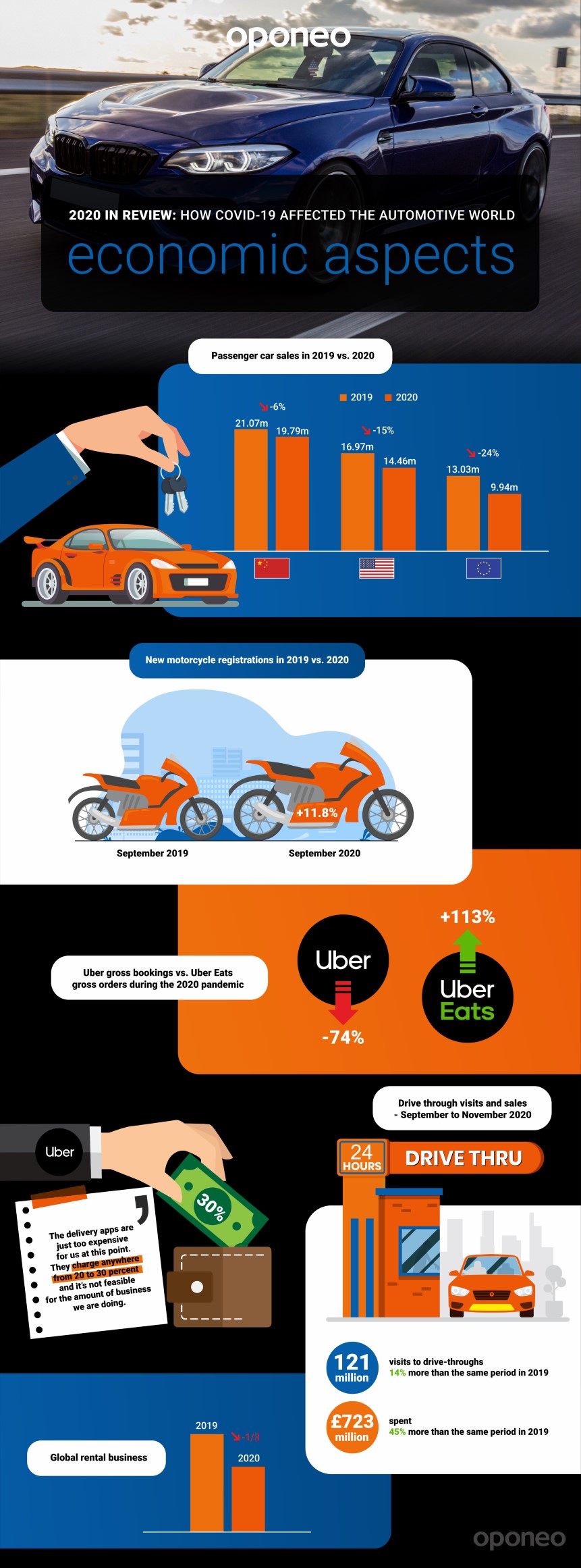The world surely took a twist when Covid-19 struck. Our daily routine suddenly had to be adjusted to a “new normal” where social distancing, lockdowns, and travel restrictions became indispensable means to keep us as safe as possible.
While people remained confined to their homes, the transportation system, which before the pandemic had served to enable us to commute to our workplaces, educational institutes and businesses, practically came to a standstill. As a result, the automotive industry plummeted and suffered the worst losses ever recorded in recent history.
Let’s go through some facts and figures on how the Covid-19 pandemic has left an impact on different sectors of the transportation world and what we can expect in the future, keeping in mind that the Covid-19 virus is still lurking around.
1. Pollution control
Let’s not blame Covid-19 for everything. After all, it has made at least some of us realize how our daily activities have been destructive to the environment. As the traffic came to a bare minimum, the release of greenhouse gases also declined considerably. So much so that in the year 2020, a 7% decrease in CO2 emissions was recorded globally. It seems that all our environment needs to flourish are humans in the safety of their own houses.
2. Road and Vehicle Safety
Another benefit of reduced transportation is road safety. In 2020, the number of reported vehicle accidents was lower than before, which is a positive sign. However, it is worth mentioning that in cases of collision, more accidents were fatal.
Many people’s need to drive their cars significantly reduced and, consequently, motorists cared less about the maintenance. A similar situation prevailed in the Covid-19 pandemic that recorded a fall of 55-60% in vehicle repairs. This trend was partly because of financial issues and partly because of general fearfulness in public due to coronavirus.
3. Sale and Purchase of Vehicles
It is no exaggeration that this pandemic has shaken the global economy. Though some businesses grew exponentially, the majority suffered a terrible setback, just as the automotive sector.
China was the first to bear the bad news where passenger car sales declined rapidly by 71% in February 2020. Similarly, Europe faced 80%, whereas the USA suffered a 47% decrease in sales during April 2020. For the motorcycle industry, an 11.8% increase in sales was recorded in September 2020.
4. Rental cars and delivery businesses
As the dependency on transportation declined, the commerce associated with it also took a downward turn. Rental car business and cab services like Uber recorded a considerable drop in revenues.
On the other hand, services and online apps associated with food and grocery delivery became more profitable while charging 20-30% delivery fee for each order. An example is Uber Eats which received 113% more orders during the pandemic. A similar figure was noted for takeaways, where 45% more orders were placed than in 2019.
5. Use of Public Transport
There once was a time when public transport was preferred over private vehicles in some parts of the world but the year 2020 has reversed this mobility preference. Like other automotive sectors, the public transport department has also suffered greatly at the hands of Covid-19.
At first, it was completely shut down in many countries to halt the spread of the virus. Once they opened up, healthcare protocols were put into action to ensure social distancing. Yet people still avoided using buses and trains to prevent themselves from the illness. Due to these reasons, Germany observed a 36% drop in public transport usage while in China and Japan, the documented figure is a 58% decrease.
6. Embracing Bicycles
An increased number of people have adapted eco-friendly transportation options to adjust to the new lifestyle ruled by the pandemic. Who would have thought that bicycles would make a comeback in the year 2020?
According to the facts, a great global boost in cycling was observed, where European and Asian countries led the way. Outer London had been the trendsetter in this regard where a substantial 22% increase in popularity of cycles was seen.
Future Perspective
The year 2021 has come as a beacon of hope for automotive investors. With the number of Covid-19 cases decreasing and vaccinations being administered, things are finally settling down. Eased lockdowns, permissions granted for foreign travels, and the gradual opening of markets, restaurants, workplaces, and educational institutes are seen in many parts of the world, bringing air and road transportation systems back on track.
Although automobile sales have taken a sudden leap upwards, it will probably take till the year 2023 for this sector to regain its lost glory. Perhaps research and innovation are needed to incorporate more green technology in modern-day transport to avoid such hindrances in the future.
Recommended Reading: Benefits of developing a grocery delivery app




1 thought on “6 Ways Covid-19 Has Affected the Automotive and Transportation Sector”